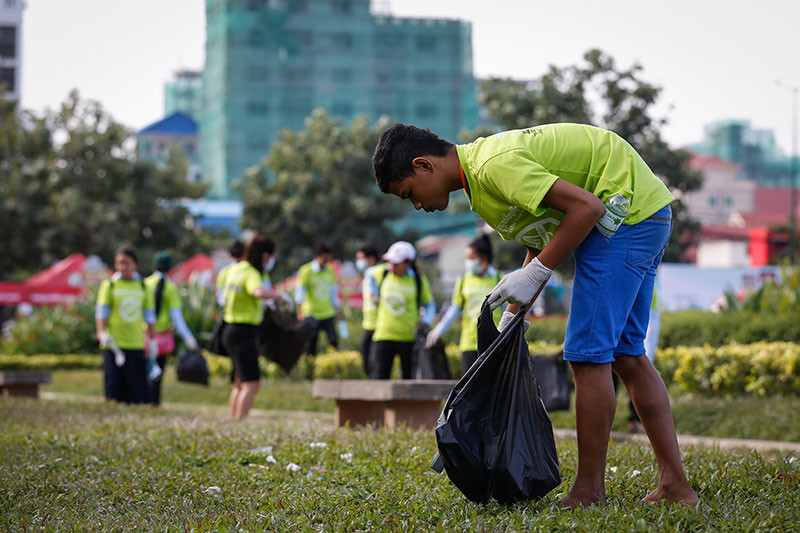The future of disposable packaging is banana leaves, according to the government and Unesco, which on Friday launched a campaign to “Make My Country Plastic Bag Free.”
About 300 students and youth-group members gathered at Phnom Penh’s Wat Botum park on Friday morning to launch the campaign, which has been preceded by televised public service announcements explaining that plastic is not biodegradable and outlining the damage it does to the environment.

“We need to work together to reduce our use of plastic bags and instead use natural things that do not impact the environment, such as banana leaves and lotus leaves,” Tourism Minister Thong Khon told the crowd, adding that plastic does not break down “for 1,000 years.”
“I always see people people at tourist sites selling Cambodian milk fruit and pomelo in plastic bags. Why don’t they use baskets made from bamboo? Buying a roast chicken, they can package it in lotus leaves or banana leaves. We grow a lot of banana and lotus.”
Wrapping goods in banana and lotus leaves was the norm in wet markets and among street sellers until the mid-’90s, but the natural packaging has all but disappeared, replaced by the plastic bags that litter roadsides and choke storm drains.
Hun Many, the youngest son of Prime Minister Hun Sen and leader of the country’s largest youth group, also addressed the crowd on Friday.
Standing in front of a giant plastic backdrop bearing the campaign’s slogan and the names of its sponsors — Bayon Market and Thai Huot Market — Mr. Many focused on water bottle caps, which he said were too often removed and thrown on the ground.
“When we open the bottle, we need to put it [the cap] in our pocket and take it to a trash can,” the recent Gusi Peace Prize winner said. “We must change our habits.”
Mr. Many’s address proved both relevant and timely, as hundreds of small plastic water bottles — each dozen wrapped in its own layer of plastic — had been stacked among the crowd for consumption.
Also a party to the campaign is the Environment Ministry, represented on Friday by undersecretary of state Suo Sovuth, who used the national football team’s recent World Cup qualifier against Japan to bring the anti-plastic message to those in attendance.
“When the match was finished, we all went home, but the supporters of the Japan team stayed and collected trash through the night,” he said. “I am an environmental person, so this hurt me. We should consider this and be inspired.”
Following the speeches, those in attendance split into groups to collect trash from various areas of the city. Each participant equipped with a plastic bag, rubber gloves and a plastic water bottle, they spent about an hour scouring Wat Botum Park, Hun Sen Park, Koh Pich island and the riverside.
Asked about the use of so many disposable plastic items in a campaign to eradicate plastic, Tito Hong, a 28-year-old physician and member of Hun Many’s youth group, pointed to the pile of black plastic bags his group had filled with trash from Hun Sen Park.
“The rubber gloves go into the plastic bag and then the rubbish car comes to pick it all up,” he said.
Anne Lemaistre, head of Unesco in Cambodia, described the campaign as an “exemplary gesture” and said it would live on through the TV spots, which Unesco had funded, and be revived for a wider-reaching “second edition” after Khmer New Year in April.
The message — “Make My Country Plastic Bag Free” — had not been lost on Friday’s volunteers, she said.
“The message, first, is to throw plastic bags into bins. Then, to reduce plastic bag use and promote the use of banana leaves, bamboo, rattan baskets and cloth,” she said.
At Thai Huot Market on Monivong Boulevard, where many individual vegetables are wrapped in plastic and lemons are sold in pairs in small plastic boxes — staff are being coached to educate customers on the evils of plastic, said branch manager Nguon Sambath.
And the effort seems to be working, he said, although he added that there was no sign of banana leaves coming back in vogue.
“We cannot force customers, but we explain that it is better not to use plastic bags. We ask them to use bags made of [paper],” Mr. Sambath said, estimating that 50 percent of customers had already made the switch.
“Reduce by 100 percent? Cannot,” he added. “Not even in Europe can they do that.”